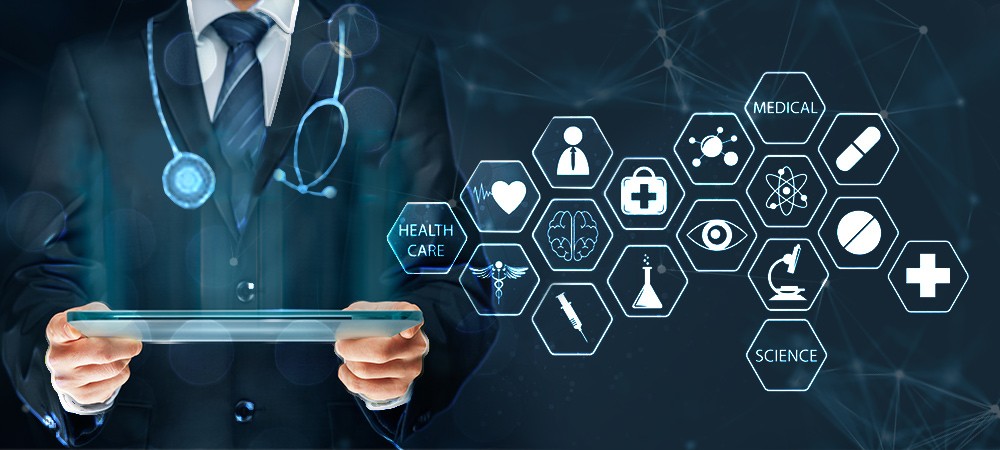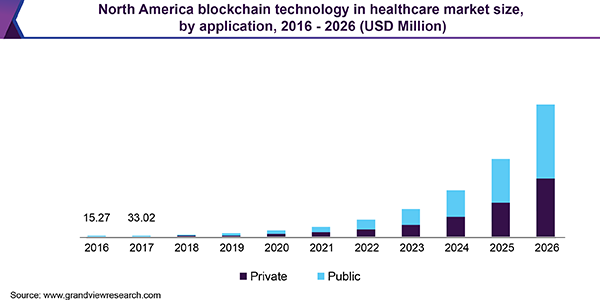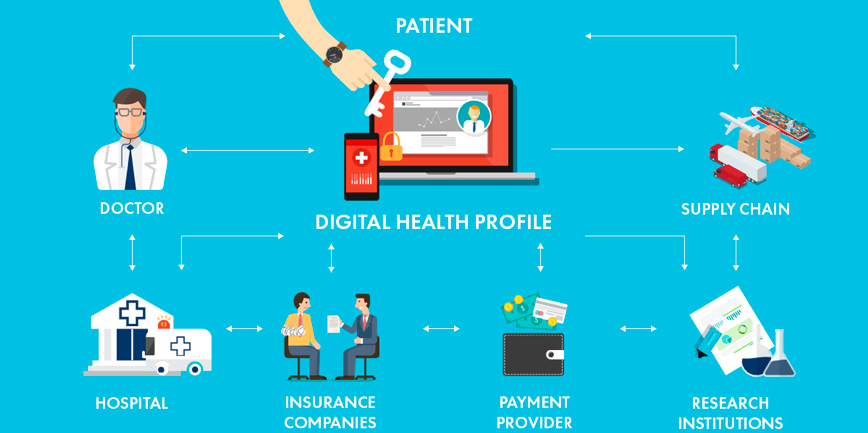
Blockchain possesses incredible potential, that's why blockchain systems are considered as a paradise for data. In all these years, the discovery of Blockchain has been enjoyed for the introduction of distributed systems to secure data by cryptography.
From the creation of cryptocurrency to distributed ledger systems and mobile applications, this technology is being welcomed by every business vertical, and its adoption has become complimentary for companies. Moreover, its adoption can majorly be cherished by the healthcare industry.
A number of IT institutions are engaged in finding the most promising usage of blockchain technology in healthcare. Let's take a brief look at Blockchain adoption in 2020.
The Global Blockchain Adoption
In 2020, the worldwide spending on blockchain systems is USD 4.3 billion. As per Statista, the market of Blockchain will be worth 20 billion USD by the year 2025. Its most critical adoption can be seen in the healthcare industry, where this technology is being considered as the biggest game-changer.

The truth is that this technology has shown a path to distributed systems coupled with unmatched security measures That secure data in a chain of blocks infused with cryptographic locks. Top-notch level security and quality of not being tempered by any external entity boost its adoption in several instances.
Almost every industry is leveraging this technology for advancing their work environment and infusing transparency, security, and low data tempering risk. In such scenarios, the space healthcare setting has found its usage exciting and paradigm-changing.
Here are some pointers that will show you the significance of blockchain adoption in the healthcare industry.
15% of healthcare agents have planned to implement a blockchain system by the end of 2020.
Different medical healthcare systems are being utilized to keep the records of billions of patients throughout the world.
In 2016, medical healthcare data fraud resulted in the loss of $30 million in the USA.
Every year, millions of healthcare records get breached across the world.
Clearly, data security is essential. Thus, blockchain adoption is the most sought-after solution. In such a setting, the launch of a blockchain system in Cyprus hospital is most significant. Let's take a look at it.
The ways Blockchain can impact the healthcare industry
This technology has immense potential and can enhance healthcare systems in different ways mentioned below.
Health Records — Blockchain technology can change many aspects of healthcare, including health data. Stored in various locations under the current accounting system.
Control of scattered persons. This means that the patient's consent and medical history records can be Incomplete, contradictory or unclear. Records stored on the Blockchain can provide complete health records give greater control over your information to individuals, and to patients. Any consent can be given and stored on the Blockchain.
Clinical trial management — Similarly, blockchain technology can be used to manage clinical trials. Blockchain tools can automatically connect clinical data and disseminate it to different researchers and let's practice. Due to the irreversibility of blockchain records, the possibility of audit and data verification can be simplified.
Providing credentials: are another function for which the Blockchain is well suited, as it is a directory of providers of health insurance plans. These concepts are not theoretical. More recently, Humana, Multiplan, Optum, Quest Diagnostics, and UnitedHelcare announce a pilot program that will use blockchain techniques to manage data providers to improve data quality and reduce administrative costs.

Improved Supply chain: Blockchain is an elixir of improved traceability and transparency in the supply chain for healthcare, providing both the big picture and the smallest details of every transaction of any pharmaceutical product.
With inventory data stored on the Blockchain, patients can acquire real-time information about the production of any drug to a retail pharmacy. Barcode notation will allow you to implement other functions in the system, such as:
Monitoring the availability of medicines in clinics
Who was given the medicine?
Drug amount transferred
In short, Blockchain can collaborate all the disconnected data segments of a resource into the life history of any resource, whether it is about the medical history of a patient or the drug moving throughout the supply chain.
Vechain launches Blockchain-based medical platform in Cyprus hospital

The Mediterranean Hospital in Cyprus has adopted the E-HCert application, which provides an archival solution based on the Weichen Thor blockchain. Vechin revealed the news on Twitter on June 20, stating that it would now be useful for hospital patients to conduct COVID-19 tests and store their results on the Weichen blockchain. Thanks to this initiative, citizens of Cyprus will be able to confirm their health status, which will allow them to go abroad or return to work.
Moreover, Vechain also infused a blockchain-based medical data management platform. It was named The E-NewHealthLife. Mediterranean Hospital of Cyprus is the first to adopt this blockchain-based data management system. The platform is the result of the collaborative effort of VeChain and I-Dante.
VeChain and I-Dante Partnered to Developed Blockchain-Based Medical Data Management Platform
Attempts have been made to modernize the technology infrastructure in the health sector, but problems include administrative and technical difficulties in combining data from various digital systems, rising costs, and balancing health issues and privacy issues, which have expended much effort. This dilemma has given rise to an urgent need for low-cost but high-performance digital solutions.
Thanks to proven benefits in terms of secure data storage and efficient exchange of information between multiple parties, blockchain technology has become the best option.
There is an urgent need to provide better and more effective medical solutions that may be subject to better patient-centred medical care, secure data exchange, use of patient data and rules of exchange, in which case the e-web application implementation is decided. NewHealthLife in the hospital's emergency department as the first phase of this project.
VeChain ToolChainTM with I-Dante developed The Digital Healthcare Passport. It is an encrypted NFC card that can be assigned to any patient in the hospital. These NFC cards allow patients to automatically identify themselves at the emergency department front desk, check their turn on a mobile phone, and securely manage their medical records using the e-NewLifeLife web application.
An application using Blockchain can serve both hospitals and end-users. Since E-NewHealthLife is fully compliant with GDPR (EU General Data Protection Regulation), the application allows owners to have complete control over their profile and medical records. Data can be transferred to third parties only with the permission of the owner.
Final Text
Amid the coronavirus pandemic, it is essential to keep track of each patient's medical history, this Blockchain-based platform will not just integrate the data security, but will also infuse patient data tracking for safe travel people. It is very important to include Blockchain development in every industry to get an easier and safer system.